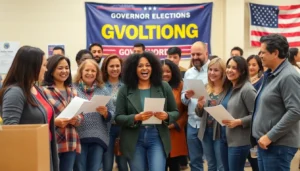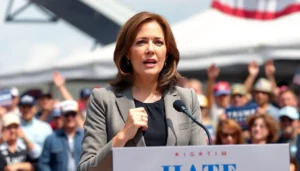As the MAA elections approach, excitement fills the air like the aroma of freshly popped popcorn at a blockbuster movie. This isn’t just another election; it’s the ultimate showdown of talent, charisma, and a sprinkle of drama that could make even reality TV producers jealous. With candidates vying for the coveted positions, the stakes are high, and the audience is ready for a thrilling ride.
Table of Contents
ToggleOverview of MAA Elections
MAA elections serve as a pivotal event in the industry, drawing attention from stakeholders and fans alike. Candidates represent diverse backgrounds, showcasing a range of talents and experiences. Voters play a crucial role in shaping the leadership of organizations through their choices during elections.
The excitement becomes palpable as candidates campaign vigorously, utilizing social media platforms to reach a broader audience. Each candidate highlights unique qualifications that differentiate them from competitors. Engaging presentations and public appearances further enhance their visibility and appeal.
Voting typically occurs over a specified period, allowing members ample time to cast their ballots. Results often generate discussions among industry experts and fans, reflecting the election’s impact on future endeavors. The aftermath of the elections continues to spark interest, as newly elected officials outline their action plans and objectives.
Events surrounding the elections often feature interviews and debates, giving insights into candidates’ perspectives. Observers closely analyze candidates’ strategies and charisma, contributing to the drama of the electoral process. Overall, MAA elections illuminate the importance of leadership in shaping the future of the industry.
History of MAA Elections
MAA elections boast a rich history that reflects the dynamic nature of the industry. These elections not only determine leadership but also highlight the evolving landscape of talent and representation.
Key Milestones
Significant milestones mark the journey of MAA elections. The inaugural election took place in 2000, establishing a formal platform for governance. Each subsequent election introduced notable changes, such as expanding voter eligibility in 2005, which increased participation rates. In 2010, the introduction of digital voting transformed accessibility for members. Over the years, the integration of social media into campaigning strategies emerged, allowing candidates to connect with a broader audience. These milestones collectively enhanced engagement and increased accountability among elected officials.
Evolution Over the Years
The evolution of MAA elections showcases both growth and adaptation. Initially, elections relied solely on in-person voting, but transitioning to online platforms made participation easier. Increased transparency became a hallmark of later elections, with detailed candidate profiles and campaign finance reporting. As candidates sought to appeal to a younger demographic, innovations in marketing strategies emerged, reflecting shifting audience preferences. Recent elections have emphasized inclusivity by encouraging underrepresented voices to run for office. This evolution not only revitalizes the electoral process but also strengthens the organization’s foundation for future initiatives.
Significance of MAA Elections
MAA elections hold substantial importance within the industry, influencing future directions and leadership.
Impact on the Film Industry
MAA elections affect the film industry significantly, steering artistic and business decisions. Elected officials often advocate for policies that promote creative expression and safeguard artists’ rights. Candidates leverage their platforms to address pressing issues, including funding, representation, and career development. Audience engagement during this period intensifies, as fans connect with their preferred candidates and discuss potential impacts. Discussions not only revolve around individual candidates but also spotlight industry-wide challenges. Elections encourage dialogue around innovation and collaboration among artists, driving strategic growth. The results of these elections shape organizational priorities, resulting in initiatives that directly impact productions and talent.
Role in Community Representation
Representation stands as a cornerstone of MAA elections. Candidates often reflect the diversity of the film community, ensuring various perspectives receive attention. This inclusivity strengthens membership engagement and inspires underrepresented voices to participate. Advocacy for issues like inclusion and equity rises during the electoral process, prompting greater awareness among voters. Newly elected officials frequently prioritize community needs, aligning goals with grassroots initiatives. Representation also cultivates trust and accountability, fostering positive relationships between leadership and members. Ultimately, these elections empower the community, creating pathways for broader involvement in shaping the industry’s future.
Recent Developments in MAA Elections
Recent discussions around the MAA elections reveal dynamic shifts and increased engagement among members. Significant developments unfold as candidates prepare to present their visions.
Notable Candidates
This election cycle features several high-profile candidates who stand out for their unique backgrounds and achievements. Candidates include well-known actors, directors, and producers, each bringing valuable experience to the table. Their platforms address critical industry needs, such as diversity and support for artists, which resonate with voters. Several candidates leverage social media to connect directly with constituents, showcasing their initiatives and gathering feedback. This openness fosters a sense of community, encouraging more members to participate in the electoral process.
Changes in Election Process
Changes in the election process enhance transparency and accessibility for voters. This year’s elections introduce a simplified online voting system, streamlining ballot casting for all members. New protocols aim to promote engagement and ensure that every voice is heard. Increased eligibility criteria allow more professionals in the industry to run for office, reflecting a broader representation of the film community. As the MAA continues to adapt, these changes underscore a commitment to inclusivity and active participation among stakeholders.
Challenges Faced in MAA Elections
MAA elections face various challenges that can impact their integrity and effectiveness.
Political Influence
Political influence plays a significant role during MAA elections. Candidates often navigate a landscape shaped by alliances and endorsements. Certain individuals in the industry exert power that can sway voter opinions and affect campaign outcomes. These influences may lead to perceived inequalities among candidates, undermining the fairness of the election process. Candidates must find ways to distinguish their platforms despite these pressures. Voter perceptions regarding favoritism can emerge, affecting trust in elected officials and their decision-making capabilities.
Voter Engagement
Voter engagement represents another critical challenge in MAA elections. Although the introduction of digital voting has increased participation, many members remain disengaged or uninformed about the candidates. Limited awareness about campaign platforms can hinder informed voting, impacting overall election outcomes. Efforts to boost engagement include timely communication and educational initiatives that inform members about candidates’ qualifications and policies. Conversations among industry professionals about the importance of participation also contribute to fostering a more engaged electorate. Enhanced outreach strategies can lead to a more vibrant and involved membership, promoting a culture of accountability.
The MAA elections represent a critical moment in the industry’s evolution. As candidates prepare to showcase their vision and engage with voters, the excitement builds. The outcomes will not only shape leadership but also influence the direction of creative policies and community initiatives.
With increased transparency and inclusivity, these elections offer a platform for diverse voices to be heard. The active participation of members is essential for a vibrant and representative industry. As discussions unfold and results are announced, the focus will shift to how elected officials implement their plans and address the pressing needs of the community.
The journey ahead promises to be dynamic, with the potential for innovation and collaboration at the forefront. The MAA elections are more than just a competition; they’re a celebration of the collective aspirations and talents within the industry.





